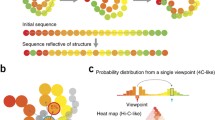Abstract
In Genetic Algorithms mutation probability is usually assigned a constant value, therefore all chromosome have the same likelihood of mutation irrespective of their fitness. It is shown in this paper that making mutation a function of fitness produces a more efficient search. This function is such that the least significant bits are more likely to be mutated in high-fitness chromosomes, thus improving their accuracy, whereas low-fitness chromosomes have an increased probability of mutation, enhancing their role in the search. In this way, the chance of disrupting a high-fitness chromosome is decreased and the exploratory role of low-fitness chromosomes is best exploited. The implications of this new mutation scheme are assessed with the aid of numerical examples.
Similar content being viewed by others
Author information
Authors and Affiliations
Rights and permissions
About this article
Cite this article
Marsili Libelli, S., Alba, P. Adaptive mutation in genetic algorithms. Soft Computing 4, 76–80 (2000). https://doi.org/10.1007/s005000000042
Issue Date:
DOI: https://doi.org/10.1007/s005000000042




